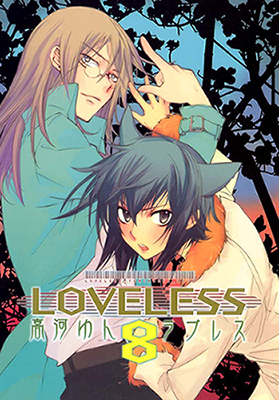Edit: Removed and rewritten to a higher standard of quality!
Loveless was my first shounen-ai anime and later manga, and what principally captured my interest in the series was the gloomy atmosphere, the tantalizing scent of a mystery needing solving, and, of course, the boys kissing. And on those levels, Loveless succeeds – it has a unique premise, and the story is woven with suspense and undertones of soft horror. Oh, and the boys kiss. A lot. Throw in a tragic yet very likeable and well-developed protagonist and unique, beautiful artwork, and you must come out with a masterpiece, right?
Weeeeell…
Let me start by praising what Loveless does right – because it does a lot right. First of all, Ritsuka. He’s a beautifully developed character and so engaging as a protagonist that half the time I think of this manga, I regret dropping it by virtue of him alone. Moody, tortured, but fiercely loveable, Ritsuka is a character you can’t help but root for, especially when he’s thrown into the sordid world Kouga’s created. His horrific home situation fosters his cool, dismissive attitude toward others, and yet it’s very clear that he’s hurting inside. He’s an angsty character who doesn’t wallow in angst despite having every right to, and it’s his unsteady perseverance in the face of trauma, I think, that hooks us and draws us to him. His is a struggle that is both relatable and endlessly sympathetic.
Another point in Loveless’s favor: Cat ears as a moe representation of one’s virginity? Brilliant! But why doesn’t the author do more with this? There’s so much potential for story and social commentary. With a premise like that, you’d think sexuality would be front and center of this series, but… it’s not. It’s there, certainly, but it isn’t nearly as prominent as I feel justifies the premise. In fact, you could take away the cat ears entirely, and the story wouldn’t be altered in any great way.
The artwork is also superb – lots of blacks and whites for dramatic effect, and it’s deliciously rich in detail. Kouga doesn’t always endear me with her artwork, but here, it really sets the tone of the story and works well with the murky narrative it’s conveying.
Now let’s talk about the not-so-good side of Loveless – the loveless side of it, if you will, and the reason I dropped it (aside from its endless hiatuses). I’m just going to say it outright – it’s the romance between Ritsuka and Soubi. Now, before you label me a prude and burn me at the stake, please at least hear me out. I have no issue with depictions of taboo relationships – incest, underage, what have you. In fact, I find them fascinating. And the relationship between Ritsuka and Soubi is fascinating. But for god’s sake, Kouga, stop trying to portray it like it’s some healthy kind of attraction!
Ritsuka is twelve. He may be a very mature twelve-year-old, but he’s still a twelve-year-old kid. Soubi is a twenty-year-old university student with a clear masochistic sexual preference, which he then forces onto said twelve-year-old. That, Ms. Kouga, is not how a healthy relationship starts. And Ritsuka doesn’t seem to think so, either. Early on in the series, he vehemently rejects Soubi’s advances. As time wears on, so does he, and he becomes increasingly more receptive toward them. This is an excellent portrayal of the erosive nature of Stockholm syndrome, and I love it. But again, that is not a healthy relationship. And yet in spite of all that, Kouga seems determined to show that Ritsuka and Soubi’s bond is a romantic, pure one. And I have a sinking feeling she’s going to make them “official couple” material by the end of the story.
It isn’t the nature of the relationship that bothers me – as I said before, I love it. I find it fascinating, psychological, and beautifully destructive. What I hate, and what prompted me to drop the series, was Kouga’s increasingly positive portrayal and normalization of the relationship. I’ll admit, I loved it when I was a teen. I didn’t care about the age gap, especially since I was so much closer to Ritsuka in age. Now that I’m closer to Soubi in age, though, I find the whole thing incredibly disturbing. And while it’s a wonderful thing to be disturbed by literature, it’s not so wonderful to have teenagers tripping over themselves to declare that this is true love, that child predation is romantic when it’s committed by a handsome guy, and that they, perhaps, should also strive for similar “romantic” encounters. Far be it from me to be a moral watchdog or someone who screams, “Think about the children!” at passing politicians, but Kouga’s sugarcoating strikes an off note to me even outside that context. If I were diving into this series now for the first time, I wouldn’t be expecting a fluffy shoujo boy-meets-girl (or in this case, boy-meets-boy) affair; I would expect a more mature look at the cruelty and obsession found in a relationship between a broken child and an even more damaged adult. And unfortunately, on that point, Kouga just doesn’t deliver. In fact, she actively subverts it, and that’s what I find difficult to enjoy.
All that considered, the series is far from god-awful, and I’d certainly recommend it for its other psychological assets. I might even pick it up again once (if) it finishes, just to see how everything washes out. For now, though, I’ll give it a 6/10 and leave it in its cozy spot on the “dropped” list.





